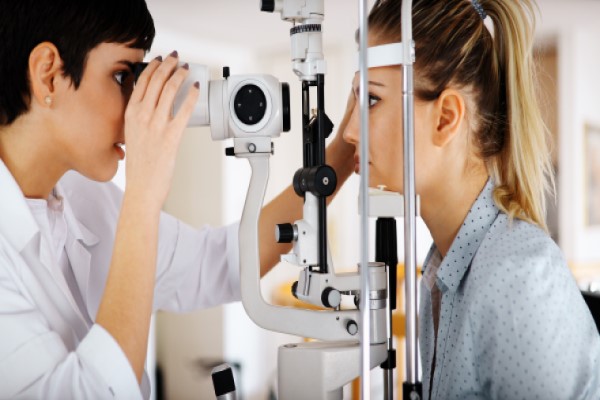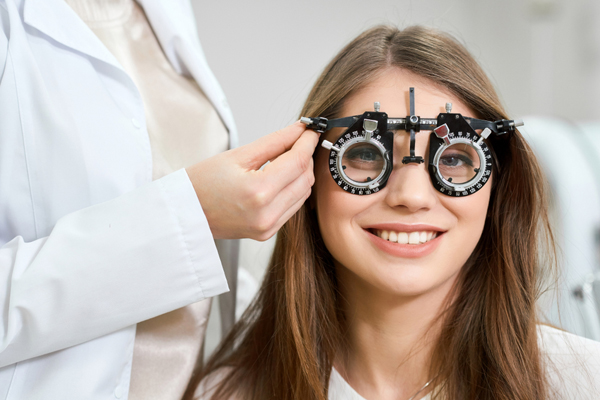What to Expect at Your Optometry Visit

Your optometry visit is right around the corner and you want to know what to expect. You will undergo an examination during your trip to the optometrist. If the optometrist finds an issue with your eyes, such as a refractive error, a treatment will be prescribed. Learn more about the eye exam so you can prepare for your visit.
Optometry exam
Eye doctors examine the health of the eye during the examination process. Optometrists also determine if patients need glasses or contact lenses during the exam. Patients who require contact lenses or glasses will receive a prescription at the end of the exam. These patients can use the prescription to get corrective lenses.
Visual acuity test
Optometrists usually begin with a visual acuity test. Patients look at a chart of letters and read them back to the eye doctor. This test allows the eye doctor to determine if the patient has 20/20 vision. Those who do not have 20/20 vision require additional testing.
Refractive eye exam
Next, the optometrist has the patient look through a phoropter. The phoropter has various lenses that the optometrist flips through. The patient looks at a series of letters and reads them back. The optometrist changes lenses to determine the right prescription for the patient.
Ocular mobility test
At your optometry visit, an ocular mobility test will be performed to determine how the eyes focus on different targets and follow moving objects. The doctor will use a light as a target. The patient will follow the target while the optometrist tracks the movements. The optometrist also might have the patient move the eyes between targets.
Sit lamp exam
The sit lamp exam allows the optometrist to get a close look at the inner workings of the eye. The patient places the chin and forehead against the binocular microscope. The eye doctor will look at the lens, iris, cornea, conjunctiva and eyelids. The doctor might also use a handheld lens to look at the optic nerve and retina.
Pupil dilation
Eye doctors often dilate patients’ pupils. When the pupils are larger than normal, optometrists can take a closer look at the retina and optic nerve. Patients who are at risk for eye diseases are most likely to get the pupils dilated. Also, patients who are 60 years or older should get this done annually.
Glaucoma test
The optometrist will also conduct a glaucoma test to rule out this eye disease. Non-contact tonometry is the most common glaucoma test. This is often referred to as the puff test since it pushes a puff of air into the eye. The test measures the amount of pressure in the eye.
Do you need an optometry exam?
You should get an optometry exam every one to two years. Your optometrist will conduct a visual acuity test, refractive eye exam, ocular mobility test and sit lamp exam. The optometrist might dilate your pupils as well. This comprehensive exam is used to ensure your eyes are healthy and your vision is clear.
Request an appointment here: https://brighteyesmv.com or call Bright Eyes Optometry at (914) 668-1429 for an appointment in our Mt Vernon office.
Check out what others are saying about our services on Yelp: Read our Yelp reviews.
Recent Posts
Emergency eye care is needed if you find yourself dealing with a problem with your eye that causes pain or affects your vision. Failing to treat eye injuries as soon as they are detected can lead to permanent consequences, like reduced vision or blindness. Common eye injuries that require emergency eye care include: Exposure to…
Looking for more information on eye protection? An ophthalmologist knows everything there is to know about protecting the eyes. While there are a few different types of eye care professionals, ophthalmologists are eye care professionals who have undergone additional years of education and training so they can offer their patients both medical and surgical eye…
Controlling myopia at an early age can slow down its progression. This can help prevent yearly upgrades for stronger glasses. Your optometrist can help by offering various treatments. If you want to find out how your optometrist can help control myopia, here are the details.Optometrists use atropine eye drops to achieve short-term myopia control results.…
Another word for an itchy eye is ocular pruritis. It is a common health situation in many people. Itchiness in your eyes is more than enough reason to see an optometrist. Receiving prompt treatment is important in receiving prompt relief. If you want to know what causes an itchy eye and the treatments for it,…



